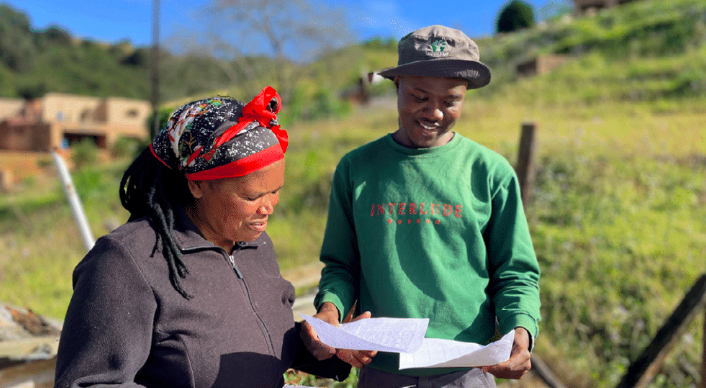
Economic circumstances, modernisation, and HIV/AIDS have led to a breakdown in traditional family
and community structures in South Africa, leaving children with little or no adult support systems.
The University of Cape Town estimated that in 2022 there were 497,000 children whose parents had
both died (Children count UCT.ac.za ). Many of these are cared for by grannies (gogos) or by child
siblings.
Imagine … you live in Sweetwaters, an area of stunning beauty near Pietermaritzburg, Kwa
Zulu/Natal. Although there are some 100,000 residents there is almost no paid employment. The
climate ranges from extreme heat in summer to piercing winter cold.
Imagine … you are a widow with no pension and no source of income. In the last three years you’ve
lost both beautiful daughters from HIV/AIDS. Between them they had 7 children. You are now their
mother. Within the last year you’ve taken on 4 more orphans. You have 11 young mouths between
two and nine years to feed and clothe.
Although antiretroviral drugs have fortunately slowed down the death rate among adults of
parenting age, the above scenario is not uncommon. More than 20 years ago a group of concerned
individuals from local churches set up the Bonginkosi Self-help project with the aim of giving
residents of Sweetwaters the opportunity to generate income. Activities included the crocheting of
blankets, crocheting hats from waste plastic bags, candle making, hand sewing embroidery, machine
sewing of school uniforms and clothes, brick making, and helping people to grow food from donated
seeds.
For many years the project was ably run by Julian and Sarah Crossley and Carole Cassidy. Together
with helpers, they even risked going into the area when unrest made it dangerous. In 2023 the
project was adopted by African Enterprise and it is now formally a part of AE’s ministry, and is run
by Linda Grant and Londeka Gasa. Each month the AE team visits the project with its 200 or so
members (primarily grannies caring for children), each representing a household of at least 10 family
members. A church service is held, talks and demonstrations are given on topics such as nutrition,
and members display the items they have made, such as handbags and baskets (including bags made
from ties that belonged to Stephen Bowley, Co-founder of Thembisa!).
As a result of ongoing poverty and unemployment, as well as the COVID pandemic, the dream of
making the project self-sustaining has not been possible. Donations of food, clothes and raw
materials for the crafts have been an ongoing necessity, but the team continue to look for ways of
moving away from a culture of handouts and to help in the marketing of handcrafts. Recent activities
(2025) have included making of reversible aprons, knitting of dishcloths, training of ladies in beauty
skills to help them find employment, and a shoe repair training workshop for 10 days for 15 of the
unemployed men amongst the members. A fenced communal garden has also been established for
the growing of vegetables.
In an area where many feel hopeless, the Bonginkosi project is a beacon of practical and spiritual
hope.





